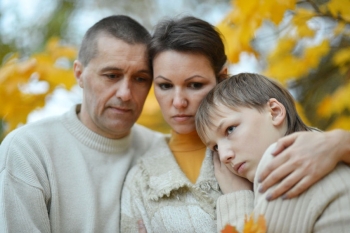
Being human means feeling the pain of loss, usually through death, at some point in our lives. Though we all want our loved ones to live long, healthy lives, and die painlessly in their sleep, reality is more complicated. Death challenges the “natural order” of things, as sometimes children die before their parents, or young, healthy people are stricken down suddenly and unexpectedly while others seem to live on well past their expiration dates. Complicating loss even further is that society as a whole dictates how, how long, and who is appropriate for us to mourn. Few employers offer extensive compensation or vacation benefits for the death of a family member, and only certain relationships are recognized under bereavement policies. For example, the death of a parent permits more time off than the death of a more geneologically distant family member, implying that immediate family relationships are always more meaningful than those outside the family. Furthermore, our society is largely death-denying, as individuals and corporations place value on productivity, vitality, and youth. Our Western culture eschews caring for the elderly in our homes, and, again, employers offer limited benefits to help younger family members care for older ones.
Despite the narrow and inflexible prescriptions society provides us in the face of loss, it is generally accepted that, if a physical death occurs, permission is given to grieve. However, loss is far more complicated, and individuals can grieve relationships when there is both a physical loss but a psychological presence, or a psychological loss but a physical presence. These types of losses fall under the category of Ambiguous Loss, a theory developed by Pauline Boss.
According to Boss, ambiguous loss represents a type of grief where an individual is absent in some way or another, with either no verification of death or no assurance that they will return either to physical presence or cognitive capacity/the way they were. It is subdivided into two types: Type 1 ambiguous loss defines situations where an individual is no longer physically present, but a psychological presence remains. This can occur in cases of missing persons, natural disaster, divorce, loss of contact with family members, child custody battles, or even during times of immigration when family members are separated. These situations can be heartbreaking, as there may never be confirmation that a physical presence will return, or that a relationship will mend, and yet, a person can grieve this loss all the same. The lack of certainty and sense of completion that happens with a physical death can cause others to invalidate a Type 1 loss, and even well-meaning friends may tell a griever to “have hope” or say “well at least your loved one isn’t dead”. In cases of complex relationships, a griever may be making the best choice for themselves by cutting off a toxic family member, but this loss can be painful and isolating. There may be little room allowed by family, friends, coworkers, and society, for a griever to take time to process and work through the loss.
Type 2 ambiguous loss occurs when an individual may be physically present, but psychologically absent. The most common example of this occurs when a loved one is diagnosed with a progressive disorder like dementia that slowly takes their memories or a more sudden traumatic brain injury that alters their personality. Other circumstances, such as drug addiction or serious untreated mental illness, may cause a person to become “different” as the disorders cause them to no longer be who they once were. Type 2 loss often involves a tremendous amount of caregiving and/or emotional intensity on the part of grievers as they attempt to navigate life with a different, sometimes damaged, or difficult person. There is rarely any emotional or physical support for Type 2 grievers, as a physical presence still remains and therefore individuals are expected to “handle” these difficult experiences. In such cases, grievers may have already used workplace benefits or important connections to help care for their loved one, and they may be in desperate need of respite. Boss also suggests that Type 2 losses can be defined as those in which no meaning can be found or no sense can be made, such as suicide or babyloss.
If this is your first time learning about ambiguous loss and you think you may be experiencing it, know that you are not alone. The best next step is for you to reach out and find support via and individual therapist or peer group that can help you normalize, validate, make meaning, and learn to live alongside the loss. Part of this process may involve educating your significant others about this loss and telling them what you need during this time. Because ambiguous loss is not a common concept, it can be helpful to tell loved ones, “Please don’t tell me everything is going to be ok”, or outlining what other attempts at well-meaning comfort feel hurtful and inappropriate. Calling others out on their language can be an empowering first step in helping them, as well as you, make a place for ambiguous loss in your life. Therapy can also be invaluable for helping you to set up boundaries as you cope with what may often feel like an unending marathon of loss, as well as talking through and rehearsing difficult conversations, or even creating rituals or ceremonies to help you create a sense of control with ambiguous loss moving forward.












